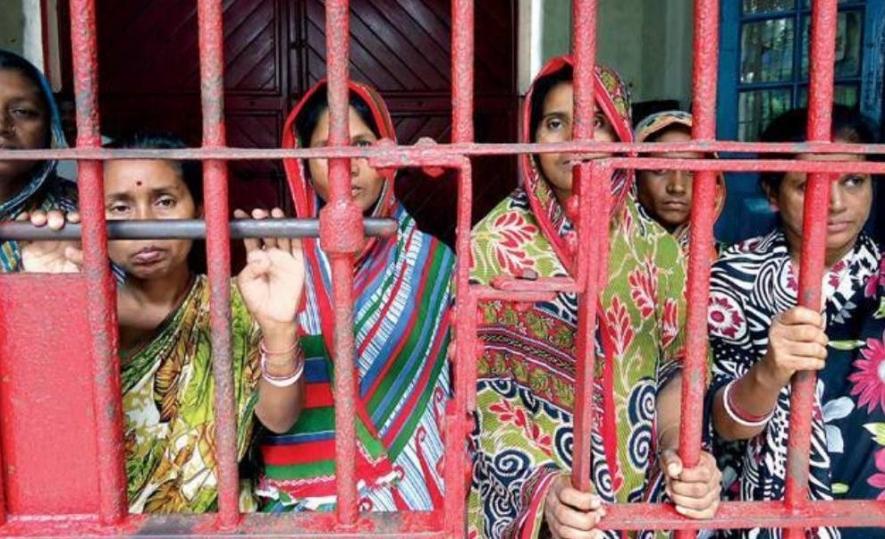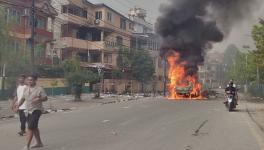Assam: Indefinite Detention for Those Without Documents

The only detention centre for women is in Kokrajhar. | Image Credit: Sentinel Assam
Amnesty International released a report on foreigner detention centres in Assam yesterday, November 23. The report highlights the procedural lapses in determining a person’s citizenship status through the proceedings in the Foreigner Tribunals under the Foreigners Act, 1946. Further, the report also pays attention to the absence of policy, let alone regulation – whether statutory or otherwise – on how to deal with those declared foreigners. Though the report did note that the National Register of Citizens (NRC) process has contributed to anxiety among the Bengali speaking population of Assam, the focus remained on the detention centres.
Recommendations of the Amnesty Report
Towards the end of its report, Amnesty International listed some ‘recommendations’ to the Government of India and to the Government of Assam. To the Government of India, Amnesty International recommended that detention should only be used as a last resort and that a statutory time limit on detaining ‘irregular foreigners’ should be introduced.
Regarding the Government of Assam, Amnesty International recommended that the detained persons should be separated from the ordinary convicts and undertrials, and to be housed in a separate facility. They also recommended drafting an operation manual as well as making provisions for healthcare, inclusive of mental health. With regard to children living in detention centres – which violates the Convention on the Rights of the Child – they recommended that the Assam government take steps to fulfil their legal duties in the children’s best interests. Lastly, Amnesty International recommended that the state government allow independent audits of their detention facilities, and to ensure that the principles of natural justice are followed in the Foreigners Tribunals.
Also Read | SC Admits Petition Seeking Directions Regarding Detention Centres in Assam
Re-Inhuman Conditions in 1382 Prisons
The concerns that Amnesty International highlighted were also raised by Harsh Mander in his interlocutory application in Re – Inhuman Conditions in 1382 Prisons. On September 12 this year, the Supreme Court passed an Order issuing directions regarding the condition of the detention centres in Assam. The Union Government was directed to prepare the manual of detention centres promptly, indicating that till now these centres had been operating in the absence of any guidelines.
The Government of Assam was directed to expedite the construction of a proper detention centre as an amount for the same had already been sanctioned by the Union Government. It also directed the Assam government to look into the matter of families being separated after being declared foreigners. Since there is only one detention centre for women in Kokrajhar, children up to the age of six years stay with their mothers. After male children attain the age of six years, they would be transferred to stay with their fathers. The Court also directed the Assam government to provide the detained people with cooking gas as until date, all cooking had been done with wood.
Amnesty International’s report also took into account that the friction between Assamese and Bengali speakers in Assam, including the issue of migration – whether pre or post partition – had been raised in the Constituent Assembly, when the Constitutional provisions for citizenship were being debated. It was argued that migration had to be curtailed with special reference to the inner line areas. At the time, Assam comprised of present day Assam, Meghalaya, Mizoram and Nagaland. The Governor of Assam – along with the Ministry of External Affairs – also exercised powers over Manipur and the North East Frontier Agency, now Arunachal Pradesh. The inner line is still in use by Arunachal Pradesh, Mizoram and Nagaland.
Also Read | The Citizenship Bill and the Resurgence of the Rising Sun
It is quite clear that the demand was not quite heeded by the esteemed members of the Constituent Assembly, which perhaps contributed to a sense of marginalisation and victimhood in the Assamese middle class. The movements in Assam began within the first decade of the Constitution coming into force. The language movements in the Brahmaputra and Barak valley were perhaps the first manifestations of this after the Constitution was adopted. Then came the infamous anti-foreigner agitation which culminated in the Assam Accord.
Repatriation: What are the Possibilities?
The report has quoted Akhil Gogoi of the Krishak Mukti Sangram Samiti (KMSS) as making statements to the effect that the detention centres are inhuman, and that all the foreigners must be returned to their countries of origin in a dignified manner. However, it is clear that the country of origin is usually presumed to be Bangladesh, but the people accused themselves may not be so sure considering how porous and unmarked the border is. This ambiguity is perhaps what makes it difficult for India to have a repatriation treaty with Bangladesh. The only existing mechanism for repatriation is a long and arduous process involving the Government of Assam, the Union Ministry of Home Affairs, the Ministry of External Affairs, and the Government of Bangladesh, along with probably as many levels of bureaucracy. Only when the Government of Bangladesh is able to verify that the person is actually their citizen, will the person be repatriated.
Also Read | The BJP Will Find Itself in a Bind Over the NRC
The next issue is then what happens in cases where the Government of Bangladesh is unable to verify whether the person is their citizen or not. In such a circumstance, there are few options for the Union Government or the government of Assam. One option is to let the person go. This option may not be palatable to many in Assam. The other option is to free the person while conferring basic constitutional rights that are available to non-citizens of India, or strip them of citizenship rights. The third option, which seems to be the prevailing practice, is to detain them indefinitely. Between freedom with limited rights and indefinite detention, perhaps the former is the optimal solution, though many outside Assam would be inclined to argue for a complete amnesty as the first option entails.
Get the latest reports & analysis with people's perspective on Protests, movements & deep analytical videos, discussions of the current affairs in your Telegram app. Subscribe to NewsClick's Telegram channel & get Real-Time updates on stories, as they get published on our website.
























